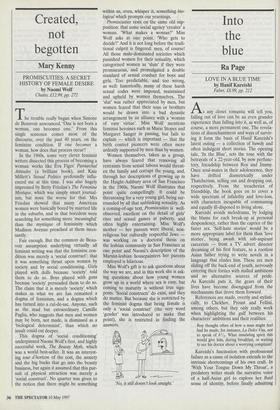Created, not begotten
Mary Kenny
PROMISCUITIES: A SECRET HISTORY OF FEMALE DESIRE by Naomi Wolf Chatto, £12.99, pp. 272 The trouble really began when Simone de Beauvoir announced, 'One is not born a woman, one becomes one.' From this single sentence comes most of the discourse, over the past 40 years, on the feminine condition. If one becomes a woman, how does that process occur?
In the 1960s, some very clever feminist writers dissected this process of becoming a woman: works like Eva Figes' Patriarchal Attitudes (a brilliant book), and Kate Millett's Sexual Politics profoundly influ- enced me at this time. I was also hugely impressed by Betty Friedan's The Feminine Mystique, which was simply smart journal- ism, but none the worse for that. Mrs Friedan showed that many American women were basically bored by married life in the suburbs, and in that boredom were searching for something more 'meaningful' than the mystique of femininity which Madison Avenue preached at them inces- santly.
Fair enough. But the common de Beau- voir assumption underlying virtually all feminist writing was that the feminine con- dition was merely a 'social construct': that it was something thrust upon women by society and by social conditioning. Girls played with dolls because 'society' told them to do so. Boys played with guns because 'society' persuaded them to do so. The claim that it is merely 'society' which makes us what we are has remained a dogma of feminism, and a dogma which has turned into a cul-de-sac. Anyone, such as the mad but extraordinary Camille Paglia, who suggests that men and women may be born, not made, is dismissed as a 'biological determinist', than which no insult could cut deeper.
This dogma of 'social conditioning' underpinned Naomi Wolf's first, and highly successful work, The Beauty Myth, which was a world best-seller. It was an interest- ing tour d'horizon of the cost, the anxiety and the big bucks that go into the beauty business, but again it assumed that this pur- suit of physical attraction was merely a 'social construct'. No quarter was given to the notion that there might be something within us, even, whisper it, something bio- logical which prompts our yearnings.
Promiscuities rests on the same old sup- position: that some social agency 'creates' a woman. 'What makes a woman?' Miss Wolf asks at one point. 'Who gets to decide?' And it is not long before the tradi- tional culprit is fingered: men, of course! All those male-dominated societies which punished women for their sexuality, which categorised women as 'sluts' if they were promiscuous, and promulgated a double standard of sexual conduct for boys and girls. Too predictable, and too wrong, as well: historically, many of these harsh sexual codes were imposed, maintained and upheld by women themselves. The 'slut' was rather appreciated by men, but women feared that their sons or brothers would be drawn into a bad dynastic arrangement by an alliance with a 'woman of easy virtue'. Miss Wolf mentions feminist heroines such as Marie Stopes and Margaret Sanger in passing, but fails to explain — which is important — that the birth control pioneers were often more ardently supported by men than by women.
Women themselves, taken as a group, have always feared that removing all restraints from sexual taboos would threat- en the family and corrupt the young, and, through her descriptions of growing up in the Haight-Ashbury area of San Francisco in the 1960s, Naomi Wolf illustrates that point quite compellingly. It could be threatening for a very young girl, being sur- rounded by all that unblinking sexuality. As a coming-of-age text, Promiscuities is well- observed, excellent on the detail of girls' rites and sexual games at puberty, and often highly entertaining. Miss Wolf's mother — her parents were liberal, non- religious but culturally respectful Jews — was working on a doctoral thesis on the lesbian community in San Francisco at one point and Naomi's description of the Marxist-lesbian housepainters her parents employed is hilarious.
Miss Wolf's gift is to ask questions about the way we are, and in this work she is ask- ing questions about how young women grow up in a world where sex is easy, but coming to maturity is without true sign- posts. 'Social constructs' do exist, and they do matter. But because she is restricted by the feminist dogma that being female is only a 'social construct' (the very word 'gender' was introduced to make that point), she is restricted in finding the answers.
'No, it still doesn't look straight.'


































































 Previous page
Previous page